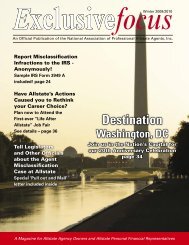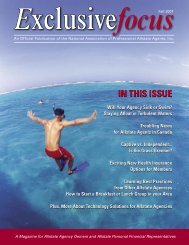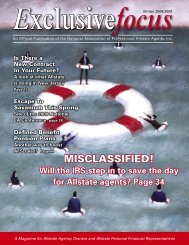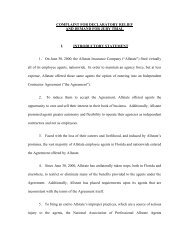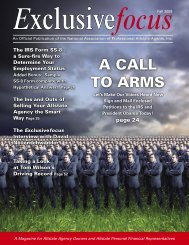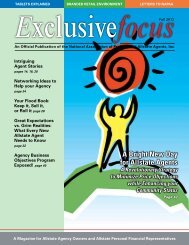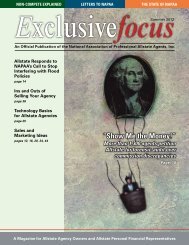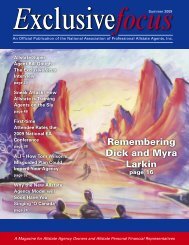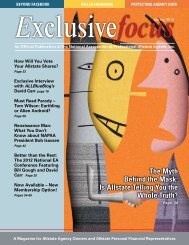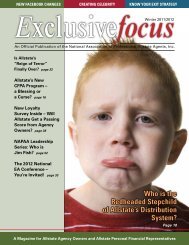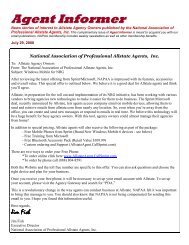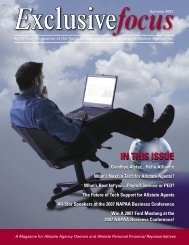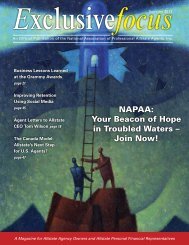Exclusivefocus Spring 2013 - National Association of Professional ...
Exclusivefocus Spring 2013 - National Association of Professional ...
Exclusivefocus Spring 2013 - National Association of Professional ...
You also want an ePaper? Increase the reach of your titles
YUMPU automatically turns print PDFs into web optimized ePapers that Google loves.
will be increased if there are more than<br />
two paid claims reported during the prior<br />
three policy periods. Hence, Allstate<br />
agents who experience three, four or five<br />
E&O claims could see their deductibles<br />
rise to $2,000, $3,000 or $4,000 respectively.<br />
The Expanded Markets deductible<br />
is also increased for multiple claims.<br />
CalSurance E&O Facts:<br />
• Coverage is provided for any act, error or omission you become<br />
liable for in rendering or failing to render pr<strong>of</strong>essional services in<br />
your pr<strong>of</strong>ession as an insurance agent. The policy has exclusions,<br />
including dishonest, fraudulent, criminal or malicious acts.<br />
• The policy covers the agent, and employees <strong>of</strong> the agent, including<br />
licensed and unlicensed staff.<br />
• Coverage automatically ceases on the date the EA Agreement<br />
terminates. On that date, the automatic one-year extended reporting<br />
period begins.<br />
• Agents may purchase an optional five-year or unlimited (lifetime)<br />
extended reporting period for 200% or 500% <strong>of</strong> the last annual premium.<br />
The extended coverage must be purchased within 60 days <strong>of</strong><br />
contract termination date.<br />
• If a terminated agent submits a written request for a mid-term<br />
cancellation and a short rate refund <strong>of</strong> premium, the one-year automatic<br />
extended reporting period is reduced to 90 days.<br />
Ignorance is no excuse anymore<br />
In order to avoid potential E&O claims,<br />
it is essential that agents and their staff be<br />
fully familiar with applicable MMGs and<br />
binding authority. Review the MMGs<br />
frequently to stay abreast <strong>of</strong> changes, and<br />
be sure to seek underwriting approval prior<br />
to endorsing an ineligible risk; then do<br />
your best to document any details relating<br />
to the exception.<br />
Agents must be knowledgeable about<br />
the products they are selling. This is especially<br />
true <strong>of</strong> new products, such as<br />
House & Home, which presents a multitude<br />
<strong>of</strong> potential E&O traps for unsuspecting<br />
agents. It is crucial that agents<br />
understand this product so they can fully<br />
explain the coverage limitations <strong>of</strong> the<br />
policy to the customer, especially when<br />
replacing an existing policy that has more<br />
comprehensive coverage. It will also be<br />
important to document those conversations<br />
with the customer. In our view,<br />
policies like House & Home present a<br />
greater potential for E&O claims than<br />
traditional homeowner policies. Don’t let<br />
the customer scream, “But my agent told<br />
me I was covered.” As always, make sure<br />
you cover the bases with the customer<br />
and document, document, document.<br />
Equally as important is the obligation<br />
for agents and staff to submit complete<br />
and accurate applications, a task inherently<br />
more complex than ever before.<br />
The new House & Home policy application<br />
includes information about the<br />
customer’s automobile ownership, auto<br />
insurance policies, driving record, ro<strong>of</strong><br />
geometry, construction materials, and<br />
more. Above all, agents and staff must<br />
be fully aware <strong>of</strong> the consequences resulting<br />
from intentional falsification <strong>of</strong><br />
information in order to obtain a better<br />
rate or better coverage. If your staff is<br />
working on commission basis, there may<br />
be a temptation for them to “cheat” in<br />
order to make more money. At a minimum,<br />
agency owners should spot check<br />
staff applications and contact customers<br />
to verify information if something looks<br />
awry. With good oversight <strong>of</strong> your employees,<br />
you will have fewer E&O claims<br />
and you’ll reduce or eliminate any unethical<br />
conduct by your employees.<br />
“<br />
“All agency<br />
owners should take<br />
proactive steps to<br />
ensure that they<br />
and their employees<br />
fully understand the<br />
MMG guidelines<br />
and binding<br />
authority.”<br />
“<br />
Agents who have not been diligent<br />
in adhering to MMGs in the past also<br />
face another dilemma – how to mitigate<br />
exposures that still remain in their book<br />
<strong>of</strong> business from previous underwriting<br />
transgressions. As an example, the<br />
agent who wrote and told us about the<br />
ineligible vehicle that her staff added to<br />
a policy suddenly realized that there were<br />
probably many more “claims waiting to<br />
happen” within her book <strong>of</strong> business.<br />
When she tried to get a list <strong>of</strong> policies<br />
that had ineligible vehicles insured, Allstate<br />
was unable to provide her with an<br />
accurate accounting, making her efforts<br />
to fix the problems much more difficult.<br />
Worse yet, errors made on policies<br />
outside your own book <strong>of</strong> business are<br />
virtually impossible to find. This is a big<br />
problem. And with the increased expectation<br />
for agents to provide service to orphaned<br />
policyholders, the agent’s E&O<br />
exposure escalates significantly.<br />
So Now What<br />
Once identified, how are past errors<br />
corrected Obviously, Allstate has no<br />
incentive to “clean up” its book <strong>of</strong> business<br />
because they actually benefit from<br />
leaving things the way they are. First,<br />
turning over claims to CalSurance saves<br />
time and money. Once a claim is deemed<br />
to be an E&O, they have little more to<br />
do with it, saving additional claims handling.<br />
Then, by not identifying problems<br />
that need correcting, they can continue<br />
to renew the affected policies for years<br />
on end – collecting premiums on risks<br />
for which they will never pay a loss. It’s<br />
like free money. Last, they save the time<br />
and expense it would take to identify the<br />
<strong>Spring</strong> <strong>2013</strong> <strong>Exclusivefocus</strong> — 17



